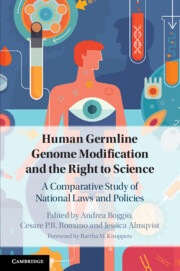 Human Germline Genome Modification and the Right to Science
Human Germline Genome Modification and the Right to Science from Part II - Europe
Published online by Cambridge University Press: 15 November 2019
In France, civil law provisions on research involving human subjects, on donation and use of human body parts, and on medically assisted reproduction – originally developed between 1988 and 1994 and generally referred to as loi de bioéthique (law on bioethics) – specify whether and under which statutory conditions activities potentially leading to human germline genome modification can be undertaken. International law, including European law, poses further conditions. This chapter explores legislative and regulatory constraints on this type of research in France, analyzing how they developed over time to reach their present state. We will show that, in France, it is prohibited to create a human embryo solely for research purposes; that, however, research activities on supernumerary embryos and human embryonic stem cells are possible upon authorization by the national agency on biomedicine; but that, nevertheless, alterations to the genome of an embryo under circumstances that allow the modifications to pass on to future generations (i.e. through a successful pregnancy) are strictly prohibited. A peculiar feature of French legislation in this domain is that the law on bioethics is regularly updated in light of new technological or scientific developments, and as a result of a national public consultation held at least every five years. In 2018 one such rounds of public consultation took place, and a report summarizing its outcome is now being considered as the basis for possible legislative reform – including in the domain of genetic engineering. While it is not possible to anticipate future legislative developments, the report signals some degree of openness in the French civil society regarding the use of genetic engineering and genome editing, at least in the context of research.
To save this book to your Kindle, first ensure [email protected] is added to your Approved Personal Document E-mail List under your Personal Document Settings on the Manage Your Content and Devices page of your Amazon account. Then enter the ‘name’ part of your Kindle email address below. Find out more about saving to your Kindle.
Note you can select to save to either the @free.kindle.com or @kindle.com variations. ‘@free.kindle.com’ emails are free but can only be saved to your device when it is connected to wi-fi. ‘@kindle.com’ emails can be delivered even when you are not connected to wi-fi, but note that service fees apply.
Find out more about the Kindle Personal Document Service.
To save content items to your account, please confirm that you agree to abide by our usage policies. If this is the first time you use this feature, you will be asked to authorise Cambridge Core to connect with your account. Find out more about saving content to Dropbox.
To save content items to your account, please confirm that you agree to abide by our usage policies. If this is the first time you use this feature, you will be asked to authorise Cambridge Core to connect with your account. Find out more about saving content to Google Drive.